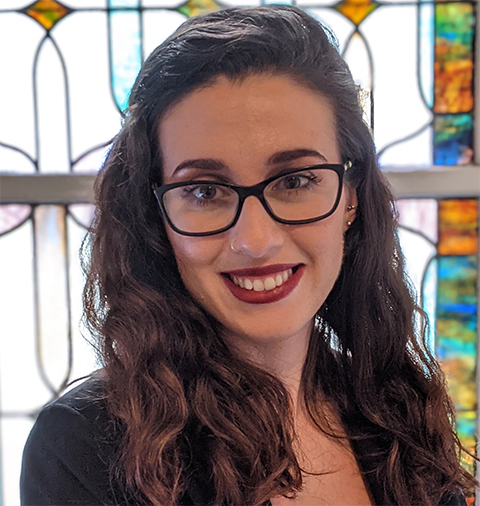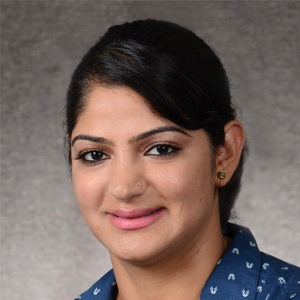
A family history of Alzheimer’s sparks interest in basic research
As an undergraduate at the State University of New York at Geneseo, Jenna Lentini wanted to become a medical doctor. However, life had a different plan for her. After both her grandmothers were diagnosed with Alzheimer’s disease at about the same time, Jenna questioned her path and became interested in understanding the molecular mechanisms underlying neurodegenerative diseases.
“As a family, we saw my grandmothers getting worse and worse with passing years with no hope in sight,” Lentini said. “Some of my relatives didn’t really understand what was happening, and I wanted to have the tools to explain what was going on with their wife, mother or sister.”

She decided to do research on the disease so she would be able to help her family comprehend what was happening. She joined Kinga Szigeti’s lab at SUNY Buffalo as a research assistant, looking into genetic predispositions to Alzheimer’s disease.
“I was really inspired,” she said. “I was working with patient samples and making a direct correlation between the disease and new findings in the lab.”
Lentini’s interest in research solidified, and she went to graduate school at the University of Rochester in New York. She decided to move away from translational research and get her hands on basic science research to bring a different perspective to Alzheimer’s. She joined Dragony Fu’s lab. The Fu lab works on RNA modifications and enzymes that catalyze these modifications.
“And there I fell in love with RNA biology,” Lentini said.
Now a postdoc at Regeneron’s neuroscience department, she is trying to understand the role of long noncoding RNAs in human cortical development — a complex process that has been hard to study due to a lack of model systems.
“In the future,” she said, “I would like to tie in my love for RNA with Alzheimer’s and dementia research, with a focus on neurodegeneration.”
Identifying a mitochondrial tRNA modification enzyme
Mitochondria, the organelles that produce energy in the cell, have their own 22 tRNAs, known as mt-tRNAs, that are generated from the mitochondrion’s own DNA. tRNAs act as translators that decode the mRNA to produce proteins, but what sets tRNAs apart from other RNAs is that they’re highly decorated with modified nucleotides.
The 3-methylcytosine, or m3C, modification found in mt-tRNAs’ anticodon loop plays a crucial role in mitochondrial protein synthesis. Despite the importance of the m3C modification, researchers heretofore knew little about the enzyme responsible for its formation.
To solve this puzzle, Jenna Lentini tagged a few potential candidate enzymes with GFP and looked to see if any of them localized to the mitochondria. Lo and behold, she found that only one of the candidates, methyltransferase-like 8, or METTL8, is associated with mitochondria and is required for m3C modification in mt-tRNAs. She and her colleagues also showed that loss of METTL8 causes m3C loss, which subsequently interferes with proper mt-tRNA folding.
Mutations in METTL8 have been found in colorectal and breast cancer. The team at Fu’s lab hope to study how the mutations perturb mitochondrial translation and how that might lead to certain cancers.
“Methyltransferase METTL8 is required for 3-methylcytosine modification in human mitochondrial tRNAs” appeared in the Journal of Biological Chemistry in April 2022. Lentini and other winners of the JBC Tabor Award will give talks during a symposium on Sunday, March 26, at Discover BMB in Seattle.
Enjoy reading ASBMB Today?
Become a member to receive the print edition four times a year and the digital edition monthly.
Learn moreGet the latest from ASBMB Today
Enter your email address, and we’ll send you a weekly email with recent articles, interviews and more.
Latest in People
People highlights or most popular articles

Simcox wins SACNAS mentorship award
She was recognized for her sustained excellence in mentorship and was honored at SACNAS’ 2025 National Conference.

From humble beginnings to unlocking lysosomal secrets
Monther Abu–Remaileh will receive the ASBMB’s 2026 Walter A. Shaw Young Investigator Award in Lipid Research at the ASBMB Annual Meeting, March 7-10 in Washington, D.C.

Chemistry meets biology to thwart parasites
Margaret Phillips will receive the Alice and C. C. Wang Award in Molecular Parasitology at the ASBMB Annual Meeting, March 7-10 in Washington, D.C.

ASBMB announces 2026 JBC/Tabor awardees
The seven awardees are first authors of outstanding papers published in 2025 in the Journal of Biological Chemistry.

Decoding how bacteria flip host’s molecular switches
Kim Orth will receive the Earl and Thressa Stadtman Distinguished Scientists Award at the ASBMB Annual Meeting, March 7–10, just outside of Washington, D.C.

Thiam elected to EMBO
He was recognized during the EMBO Members’ Meeting in Heidelberg, Germany, in October.

